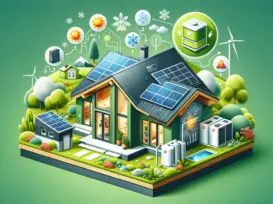Grus Home Energy - Heat Pumps
Everything You Need to Know About Heat Pumps
Heat pumps are a highly efficient and versatile heating and cooling system that can provide a comfortable indoor environment regardless of the weather outside. They work by transferring heat from one place to another, either extracting heat from the air or ground to warm your home in the winter, or removing heat from your home to cool it in the summer. This process is achieved through the refrigeration cycle, which allows heat pumps to operate in both heating and cooling modes.
There are different types of heat pumps, including air source heat pumps, ground source heat pumps, and water source heat pumps. Air source heat pumps are the most common and cost-effective option, as they extract heat from the outside air and transfer it inside. Ground source heat pumps, also known as geothermal heat pumps, utilize the stable temperature of the ground to provide heating and cooling. Water source heat pumps work by extracting heat from a water source, such as a lake or pond.
One of the main advantages of heat pumps is their high energy efficiency. They can provide up to four times the amount of energy they consume, making them an eco-friendly heating and cooling solution. This can result in significant cost savings on your energy bills, especially when compared to traditional heating systems like furnaces and boilers. Heat pumps also have a longer lifespan and require less maintenance, further adding to their cost-effectiveness.
Another benefit of heat pumps is their versatility. In addition to heating and cooling your home, some models can also provide hot water, further reducing your energy costs. They can be used in a variety of settings, from residential homes to commercial buildings, and are suitable for both new construction and retrofit projects. Heat pumps can also be integrated with other renewable energy sources, such as solar panels, to create a more sustainable and energy-efficient system.
When considering a heat pump for your home or building, it is important to take into account factors such as the climate in your area, the size of the space you need to heat and cool, and your budget. It is also recommended to work with a professional HVAC contractor to properly size and install the heat pump to ensure optimal performance. Regular maintenance and servicing of the heat pump are essential to maintain its efficiency and prolong its lifespan.
In conclusion, heat pumps are a reliable, energy-efficient, and cost-effective heating and cooling solution that can provide year-round comfort for your home or building. With their versatility and environmental benefits, heat pumps are a sustainable choice for those looking to reduce their carbon footprint and save on energy costs.
©2025 All Rights Reserved. Grus IoT Co.,Ltd.
